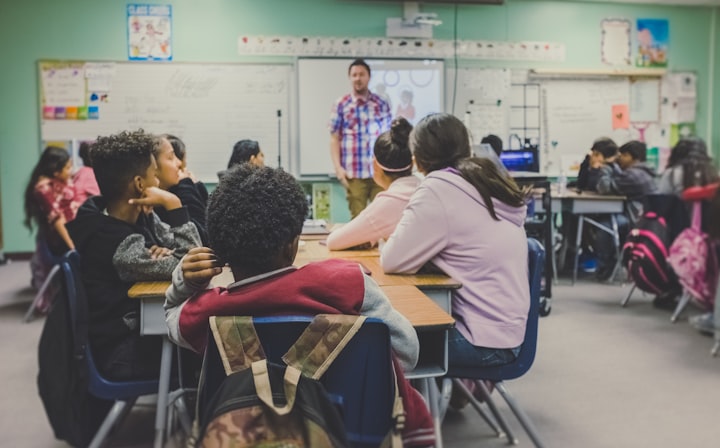How The Educational System Should Be Improved
A post on the current state of the educational system, and how it should be improved!
Quick Facts
-Our current educational system in America isn't very effective! We don't teach many things that we should be teaching.
-There are many ways of letting a child learn without having to rely on an institution to teach them.
-We should teach our children how to think, speak, and write. We should teach them all about mental, emotional, and physical health. We should teach them how to build and keep healthy relationships. And more!
Intro
The educational system has a lot of potential in America but it doesn't live up to it, often through no fault of the teachers themselves. I've personally seen and met many teachers who say what the problem really is, and I'll take the next step by offering some pieces of information we should teach our children and by offering some systems that work by replacing the educational environment. Enjoy the read!
Why Institutions At All?
It's a good question. After all, children naturally learn everything they need to as they grow up and discover the world! We never needed schools to begin with and we still don't, especially with how terrible many of them are in America - all we really need to learn is language and (maybe) mathematics.
Let's think it through - if we had no schools then children would stay at home. Since they're naturally curious they would ask questions and the parents would answer them. But since they're naturally curious they'll want to see the outside world. The patents let them see the outside world and, of course, they meet new people who teach them new things, often naturally.
Depending on their level of curiosity they'll ask more and more questions and learn more and more things as everyone around them educates them and as they educate themselves. As they grow up they'll probably have many connections and have at least a few marketable skills, and they'll have enjoyed it in the process since they were naturally being themselves all along.
Schools are not a need, but a want - we like to build these complex corporate environments and tell our children to educate themselves so they can make money in a complicated world. But what if the child did better by spending their time building a skill instead? What if they take the time they would have spent in school and use it in ways that benefit them more than school would? Many of us don't consider these questions because we tend to assume that we know best and that they need to be taught what's right (with some key exceptions of course)!
My answer is this: having these institutions can be beneficial if we are teaching our children the right things. This is the reason we have them, not because they're just a place to send our kids to every day. We certainly shouldn't make them mandatory, but a choice, and a choice that would benefit them if they made it!
Things Worth Learning
"Okay then, what are some things that are actually worth learning?"
There are some things that are worth learning early on in life! These things include:
-Language and math. If we cannot speak we may have a hard time communicating, and being able to count things and perform calculations is quite useful. We don't need to overdo it, but if the child can and wants to excel that's fine too!
-How to be psychologically, physically, and emotionally healthy. We should definitely teach our children some basic (and possibly in-depth) information about how to be and stay healthy on these three dimensions. This is one of if not the most important part of my post - I really want to see our schools teach this vital information to our children as early in their childhood as they possibly can, especially when it comes to the value of healthy food and how to cook healthy food.
-How to think, speak, and write. There are many ways to think, learning how to speak is an art in and of itself, and being able to write effectively opens up all kinds of opportunities!
-How to form and maintain healthy relationships. This. Is. Huge! If school taught us how to form healthy relationships instead of throwing us into the fire we would probably be okay for the rest of our lives regardless of the skills/talents we have/develop. Everyone has their friend type(s) and being able to stay within those friend groups (and to approach new ones) with great socialization skills taught in school is a solid solution to the lack of socializing that social media has brought upon us.
-Emotions and emotional intelligence. Can you imagine how far we'd go if school gave us an accurate description of every emotion, how it feels, what the long-term effects of holding onto that emotion are, which ones are positive and which ones are negative, and that we can more or less control our emotions at all times? We'd never have any questions about passion, confidence, fulfillment, meaning, love, happiness, intuition, understanding, or sexual desire because we learned about them and how to feel these things in school! This part is very important too not only because emotional fulfillment is important, but also because many of us in America are actively searching for it.
-Speaking of sexual desire, we should go above and beyond our normal sex-ed and give them basic information on how to genuinely please men and women. This will save some frustration from both parties later on in life!
-Intelligence and spirituality. I want our schools to show our children the works of intelligent and spiritual people, and what it really means to be intelligent and spiritual. This way they at least see the sides of life that, if they develop, will help them live better and more fulfilling lives.
-Real-life, tangible skills. Some skills that come to mind are woodworking, welding, driving, gardening (and generally tending to the earth), mechanical skills, and the option to transfer to a trade school for the last 1-3 years of high school.
-How to self-improve and how to self-realize! If you know how and which areas to self-improve in you'll be just fine when you get out of school, and knowing how to realize yourself (opening your 3rd eye, psychedelics, strengthening your mind, etc) is… Well, the thing to do.
-Beliefs and intentions. Since beliefs and intentions are so f-ing powerful we should be learning about these within our first week of starting school! We should teach them what they are, what they do, how they can use them to live in well-being, and all about negative beliefs and intentions as well… As a start! As an extension to this, we should teach them how to distinguish between positive and negative (regenerative and detrimental) behavior and feelings since these are offshoots of what we believe and intend.
-How to stay strong in hard times. So many people just blow in the wind when a trial or a hard time comes around, but we should be teaching their children how to stand up during hard times and how to be successful while doing so.
-How to live a healthy, balanced life.
Our school systems should definitely be focusing on teaching these things instead of what they're teaching now. Schools in America have gotten so lax that they're producing graduates who don't have a single clue about the things they should know, and this should've changed yesterday.
Systems That Work
I also want to give some alternate systems that work just as well (if not better) than the current educational structure we see in America.
-First, we can have a system where we don't change anything from what we see now except anything that is needed to teach our children what they should be taught. This is probably the most pragmatic solution because we can keep the structure the way it is and only make changes to accommodate the fact that we're teaching our children all of the things I mentioned above.
-We can have no schools altogether. This also works as I mentioned above - we don't have to make life so complicated, and I assert that letting life become simple again is healthier for us and the environment.
-We can build a system where no part of school is mandatory and everything's optional, kind of like college! Does your child struggle in math but excel in woodshop? Pull them out of math and put them in woodshop! School doesn't have to (I argue shouldn't) be mandatory, and having school/parts of school be optional seems to be best for the child as well.
-Depending on the child/children in question we can give them the option to self-educate. This will work if the child is ambitious and expresses a unique interest in a subject or two, they should be allowed to pursue it/them and receive credibility for it. This can also work in combination with sending them to school!
-Also, we as parents can simply do what's best for the child overall. I understand this requires attention and effort, but each child has their own wants, interests, strengths, and weaknesses, and helping them go in the direction they naturally want to go without interfering too much (IE, forcing them to participate in a broken school system) is definitely a better option for your precious child!
Conclusion
The educational system largely shapes how well and successful our children are for the rest of their lives. Right now, at the end of 2020, the school system in America is setting its own children up for failure by failing to teach them the proper things and by failing to encourage the parents to treat them in the proper way. It's truly a mess, and I encourage you to take some of the mess upon yourself and clean it up as best as you can.
Thank you for reading! If you enjoyed my article consider supporting me through Patreon! I encourage you to check out my other articles as well :) have a great day!
About the Creator
Gabriel Mohr
Hey everyone, my name's Gabriel! I love writing short stories, spreading conscious knowledge, and positivity! Author of 3 books :)
Check out my website! www.gabrielmohr.com







Comments
There are no comments for this story
Be the first to respond and start the conversation.